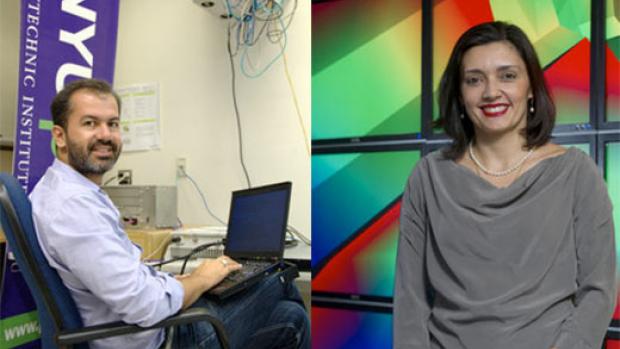NYU-Poly Professors Win Google Faculty Research Awards
Juliana Freire and Thanasis Korakis Recognized for Work in Big Data, Improving Home Wireless Performance

Brooklyn, New York— Two faculty members from the Polytechnic Institute of New York University (NYU-Poly) are among the latest recipients of the Google Faculty Research Awards—one-year grants supporting cutting-edge research in various disciplines of computer science and engineering.
Juliana Freire, professor of computer science and engineering, and Thanasis Korakis, research assistant professor of electrical and computer engineering, are among the 100 university engineers and scientists from around the globe recognized by the web search giant.
Freire’s research tackles one aspect of a major hurdle facing urban planners and policymakers at a time when more people than ever are living in cities: how to analyze extremely complex data sets to better understand the dynamics of cities, assess their service needs, and ensure that they are met. In this project, Freire is exploring data from a central element of urban life in New York City—taxi cab rides—as a model for a new framework for analyzing spatio-temporal data.
With information provided by the NYC Taxi and Limousine Commission, Freire used data from more than 540 million taxi cab rides over a three-year period to create a prototype visual exploration system that enables scientists and lay people to analyze data involving time and location on a scale that is currently impossible. Taxi rides are a rich source of information about urban life, providing insight into many aspects of New York City, including identifying areas that are most popular at certain times of day, neighborhoods underserved by taxis, and traffic patterns. These can in turn be used to better understand economic activity, human behavior, and mobility patterns.
“Tremendous amounts of data are available, but making sense of it is very challenging,” Freire explained. “Social scientists and decision-makers are limited by the current tools for analysis, which can’t handle large data sets. They can analyze slices of data, but it’s much harder to appreciate the full picture,” she said.
Freire’s model will unify data selection and visual analysis to allow even lay users to explore large data sets through visual queries; for example, a user could explore taxi service in different neighborhoods at a certain time of day by selecting the regions and time frame on a map. The query results would present highly complex information in a simple visual format. Freire and her collaborators also plan to incorporate other data sets, including data from New York City’s bike share program, Citi Bike.
Thanasis Korakis is developing a solution for a problem nearly every computer user has faced: slow broadband performance. As broadband access has become ubiquitous and wi-fi technology has been widely adopted, home wireless local networks (WLAN) have soared in popularity. The result, especially in densely populated urban areas, is extreme network congestion resulting in poor quality of service that is nearly impossible for users to address or solve on their own.
“Most home computer users don’t have the expertise to diagnose and resolve local network issues, and they end up blaming their Internet service or content provider,” said Korakis.
His fix, currently in development, is an app-based method to diagnose the cause of poor home WLAN performance, as well as a tool that can implement these diagnostics. Currently, there are several consumer products to aid troubleshooting of wired networks, but in the wireless space, detecting and remedying connectivity issues is considerably more complex.
Korakis will create extensive simulations of scenarios that can result in wireless access delay, and gauge the specific impact of each on quality of service. These include traffic congestion, overlapping channels, competition from older wi-fi-enabled devices, and low signal-to-noise ratio. Along with his students and collaborators, Korakis will devise classifications of so-called “wireless pathologies” based on the symptoms they create, ultimately arriving at a diagnostic tool that can determine the cause of WLAN problems. A complementary tool will then offer suggestions for home WLAN users to solve the problem through simple configuration changes.
As part of their grants, both Freire and Korakis will plan visits to Google to present their findings to the company’s research teams.




